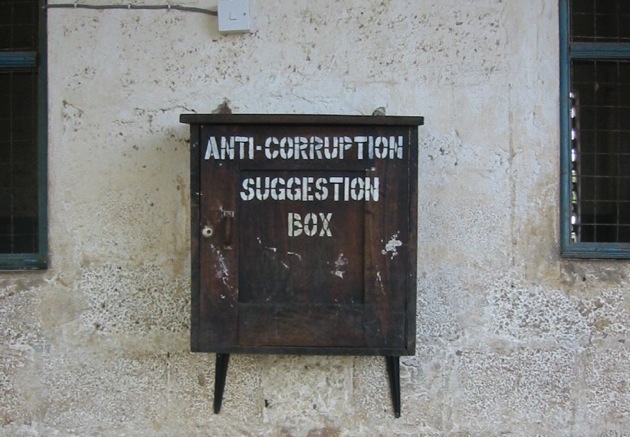 PHiLES home
PHiLES home
| Greetings Home |
 PHiLES home PHiLES home
|
| Bert Tells What He Reads |
Crtd 11-11-13 Lastedit 16-01-20
Black Mischief
1931-1932, by Evelyn Waugh, [about Waugh]
Summarized and Illustrated With Recent Africa Pictures by Bert hamminga [ about the author]
East Africa. Azania, a rather large virtual island at the Indian ocean coast. Young Seth, bachelor of the Arts of Cambridge University, grandson of a long dead Wanda tribe adventurer who took power in Azania by a means of a coup against the government of impoverished Arabs, recently had succeeded his aunt to become emperor of Azania. But Seth's father Seyid disagrees with the official succession protocol and has mobilized quite some fierce inland warriors to take power. Seth's supreme commander "general" Connolly, a shabby eccentric Englishman gone native with his beloved local wife "Black Bitch" ("Isn't she ugly? But she is good"), had ridden off on his mule with his barefoot army to fight Seyid. The telegraph's copper lines having been interrupted by theft of local tribes to make adornments for their women, they can only wait for news from the jungle by runners. But none come.
Rumours spread in town. The dominant one is that Seth, who had not paid his soldiers, hence were thought probably on the rampage, is finished. His father will invade and take power. At night many lights, clearly an army, can be seen on the far slopes of the mountains.
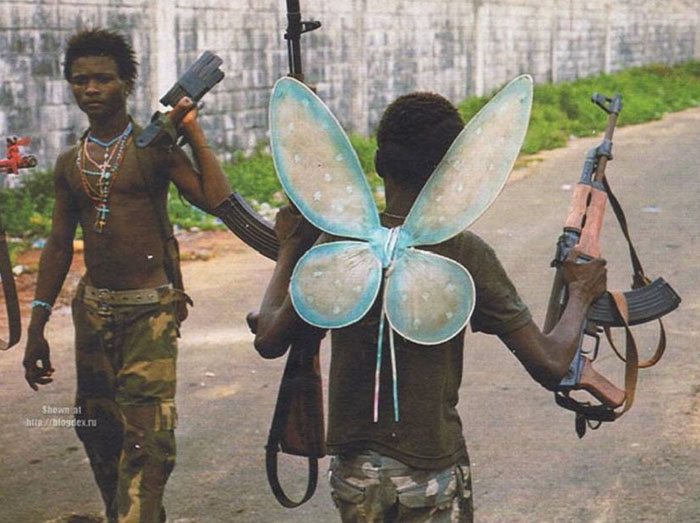
...soldiers thought probably on the rampage...
My favourite character in the book is shrewd Arminian businessman Youkoumian whom, with my apologies, I simply have to introduce (as Waugh does himself) by shortly summarizing the complex multi-stage scrimmage in which he, with some luck, saves himself, in this dangerous situation.
Read close: Youkoumian decides to prepare for a temporary stay at his brother's on the mainland. He hid his valuables and prepared a boat. But he decides he needs the 80 rupees (Azania uses this colonial hard currency of the British Empire) the emperor owes him for fuel delivered to a high government officer, for the Emperor's boat. In Youkoumian's view the disappearance of that officer, with boat and all does not change matters. His mediator in this imperial money claim issue is the emperor's Indian secretary Ali, a long standing ally of his in profitable deliveries to government. He beats Ali's reluctance to get the money by offering him a place in the dangerously overbooked boat but tells his wife that his offer to Ali is only to get the money and he will not be joining. His wife fears she will be left behind herself and has to be convinced with details about the kinds of violence to use to prevent Ali's access to the boat.
Meanwhile Ali, now knowing how to find the boat, instructs Major Joab to arrest Youkoumian and hang him at a discrete remote place "no need to mention this to the emperor, You understand?", then sets out to offer the emperor to "buy from someone" the boat for 2000 rupees to replace the emperor's stolen boat and let him flee. The emperor does not even yield when Ali goes down to 1800. Ali gives up, returns to Major Joab who reports Youkouminan dead as agreed. Joab is offered a place on the boat but refuses. In highly devious conversation Ali agrees to pay the major 200 rupees to let him pass the guards to reach dead Youkoumian's boat.
But for the major the 200 rupees was only a bonus. He had kept Youkoumian alive after learning from him about his boat before Ali told him. He got his place already. On request of Youkoumian, his wife, now the excess passenger, is tied in her bedroom by the major's men so the major can take her place. Those men also arrest Ali on his way to the same boat. On Ali's appeal ("I paid you 200 rupees to let me go!") the major turns deaf ears. In Ali's luggage crown and scepter of the throne are found. He is taken to the emperor, with the scepter "which would not be so easy to dispose of...". The major does "dispose of" the crown. In a back room, invisible to Ali, Youkoumian listens and waits in great mood, being given drinks and cigarettes looted by the major's men from his own business stocks.
Taken as an arrested suspect by the major to the emperor, Ali claims that he had prepared crown and scepter to be taken, with the emperor, on a boat he "acquired" (Ali still believes owner Youkoumian dead) for he had anticipated the emperor would change his mind and decide to flee. He had decided to do this after he had learnt that the major planned to sell the emperor to the enemy. The major gets nervous, but to his relief the emperor does not believe Ali. Seeing no more gain in hanging people, Seth sends Ali away. After which the major reports one of his men has killed Ali by mistake and shall be punished.
On the way to the boat something must have happened to Youkoumian as well. At least when the next morning he woke up in the bush his boat and the major had left and he felt, he tells her wife while she is still tied on the floor of her bedroom, "a lump on the back of my head the size of an egg".
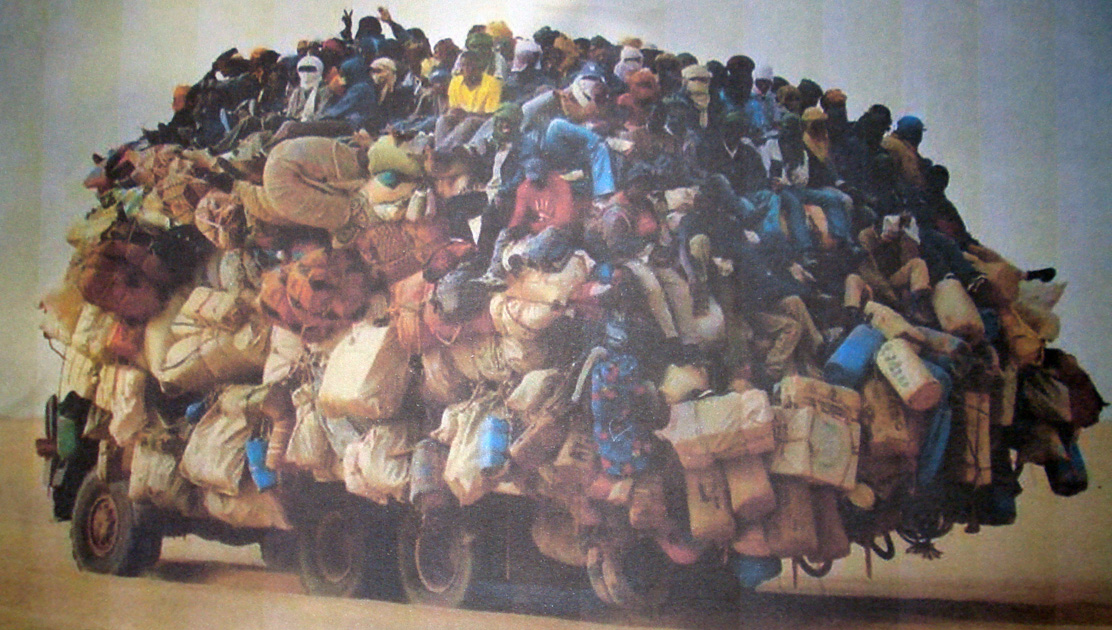
...except the emperor and Youkoumian everyone is now off...
Except the emperor and Youkoumian everyone of the local elite is now off the island, and the army descends from the hills to town. It is...Seth's army under Connolly, victorious, Seth's father Seyid eaten by Connolly's soldiers. Youkoumian's end judgment of the major: "A real fool".
In Tolstoy you would now be half way volume III. With Waugh, you're only on page 46, and, just in case you're not convinced yet that the author does not waste pages: the most important issues of those first pages are still to be dealt with. Written 30 years before independence of any former African colony, at a time nobody believed such a thing would ever happen - for the same very good reasons that we now amply have seen working in practice - the idea itself of black ruled independent African countries caused a good laugh.
Where did Waugh's inadvertently futuristic novel have it right, where did he misfire? Reading the book now, 80 years after its appearance, 50 years after the African independence, loads of recent Africa pictures, most from internet, some that required a motorbike trip of mine to be taken, popped up in my mind and inspired me to an attempt to make up the balance.
Hits and misfires in Waugh. In 1930, the African colonies were still considered to be beneficial to their colonizing powers, mainly Britain, France, Portugal and Italy. The dispute of Congo had been settled by the world powers by having it held by Belgium (at first: not by Belgium but by the King of Belgium). Waugh's story of the recent takeover by Azania black "royalty" mentions the weakness of the deposed ruling Arab elite, impoverished by the effective British naval blockade of slave trade.
That is, we now know, not the typical chain of events to independence 30 years later. The wave of independence in the 1960s was caused by the change in world trade due to technological changes in industrial and agricultural production: colonial products got less profitable on the world market by competition from elsewhere. Thus, the overhead of colonial administration made colonies a net loss of yearly increasing magnitude. Raw materials (oil, minerals) kept doing well, but their export required too little labour and social organization to warrant the huge cost of entire foreign led colonial governments. The raw materials were thought to be exploitable by managing cheaply local independently ruling elites.
This caused, during the 1950s, the Western government and business lobby to cross over to the independence-camp. Moreover, the distribution of national ownership of colonies (almost exclusively England, France, Portugal, Italy) had ceased to reflect the drastically changed world power balance. The new super powerd US and Soviet Union needed a game changer to sub rosa appropriate, at the expense of the weakened colonial powers, the access to raw materials according to their new standing. US and USSR thus posed as fierce "anti-colonialist" ideological and military supporters of the independence movements, shrewdly exploiting a host of useful currents in their home public opinions. These two developments quickly sealed the fate of the colonies, accompanied in the United Nations by generally subscribed high-brow hypocrisy concerning the "right of self-determination" and proud "victory" claims of black independence movements.
In sum, Waugh, taken as the futurologist he never even held possible he would be, understandably not guessing, in 1930, the future change in trade conditions and the rise, after a new world war, of US and USSR to main world powers, totally misidentifies the cause of independence. But its start in Waugh's satire perfectly hits the mark: the enthusiastic rule of young black students of Western universities, full of theories of swift modernization. We can only admire Waugh's anticipation, 30 years before the event, of what we saw in the after independence political honeymoon of the young new black African leaders in the early sixties, isolated and dangerously alienated from their grass roots by their Western university training.
Closest to Waugh's Azania scenario, albeit still quite far, was going to be the road to independence of Zanzibar. In the 19th century, Zanzibar's Arab rule was formally upheld by the British and hollowed out from inside, the French and Germans gnashing their teeth. In the 1950s Zanzibar started to cost Britain too much money. Moreover the US started to put pressure to give up colonies, powerful pressure, for Great Britain still owed an enormous debt from the Second World War dealt with magnanimously by the US to keep Britain strong against the USSR.
Zanzibar was granted independence in 1963. Three months after, all Arabs and Indians got chased from the island. The 7000-odd who did not find a boat in time got, as usual under black African attack, butchered with pangas, all ages, both sexes. That obviously was the immediate end of the Zanzibari economy and all exports. After the loot was finished everybody got very hungry. They called Tanganyika in for help and formed a union "Tanzania".
I visited Zanzibar in 2011. I did not see a single Arab. Nevertheless I found the black population almost completely devout in the religion of those whom they killed and chased off the island: moslems! Hidden behind the money drawer in the back of some shops I found some (Islamic) descendants of Pakistani families, who would have been called Indian by Waugh, writing 17 years before the Pakistani secession of India. These former Indians told me their parents were left alive, having been in the countryside during the massacres. When I asked more, they answered in authentic Youkoumian-style: "O Sir, do not listen to all this bad stories, it is all lies, this is a fine country, good for business and tourism".
Back to Waugh's Azania. Young fresh emperor Seth is fond of written, posted proclamations. This gives him an air of western dignity for few can read and the rest is deeply intimidated by seeing the emperor being endowed with this powerful Western juju beyond any understanding. When young Seth is to appear somewhere, proclamations carefully state and regulate dress code, behaviour of all rank and file "full dress uniform, guns, no ammunition, no alcohol..."
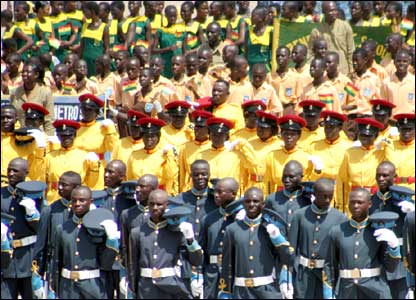
...When young Seth is to appear somewhere,
proclamations
carefully state and regulate dress code...
The Proclamation specifies the penalties for the different trespasses as well, meticulously defined: "not exceeding ten years imprisonment, confiscation of property, loss of rights, or both...".
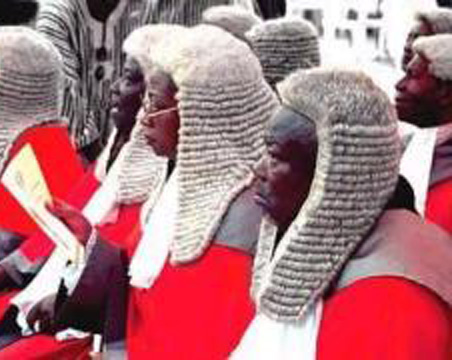
Waugh:...hanged the culprits ...
(and with them two
or three witnesses
whose evidence was held to be unsatisfactory)...
Waugh's proclamation-satire has a double target. The first are Waugh's contemporary colonial officers who did often exercise the noble Art of Proclamation in full ignorance, unwillingness to understand or even straightforward contempt of an exclusively oral culture. But Waugh targets young Seth as well, depicting him, unlike English administrators fully aware of the impossibility of any message to be understood by means of written proclamations, using them as a way to establish his reputation as powerful modernizer among the cannibal animist illiterates, yes telling them: if you want to be part of the future of my empire, you will have to learn to understand this!
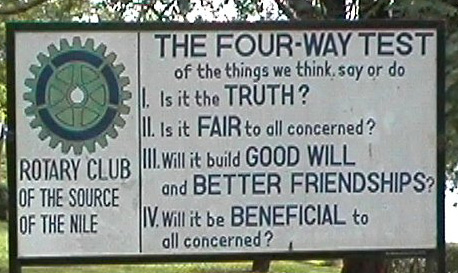
...young Seth had
studied in Cambridge...
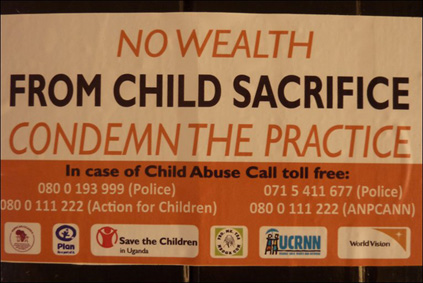
Waugh:...Posted prominently in the capital in English...
...where every foreigner
might read it...
...never promulgated in the
provinces...
Seth appoints a young English former fellow Cambridge student Basil to the post of "Minister of Modernization". Basil does not hope to modernize anything but finds it a good position from which to follow an interesting development. He immediately recognizes universal survivor and smart petty dealer Youkoumian as his ideal secretary. Youkoumian immediately orders, on his own account, an impressive heap of boots "government stuff, damn rotten. See what I mean?" to sell, through the Ministry, at a smart price to the empire's barefoot army. Modernization! And another full point scored by Waugh picturing pars pro toto how political idealism and business would start dancing together at African independence 30 years later.
Not long after, emperor Seth's proclamations have abolished death penalty, marriage, the Sakuyu (rival tribe of his own, the Wanda) language and all its dialects, infant mortality, totemism, inhumane butchery, mortgages and emigration. Then he founds a museum (Youkoumian hastes to stock himself cheaply with a host of unique treasures of Azanian culture and history), an Institute of Astronomy and a Laboratory for Ectogenesis (in vitro breeding of human egg cells to the birth stage as an alternative to female pregnancy). Things get grim when Seth invents the soft currency and Basil finds "a dozen shelves or so" stacked with "Azanian pounds" (printed in Europe, as most African currency is until today) to replace the rupee. But Basil is told not to worry, he'll get some himself. Thus Waugh's inadvertent 1930-futurology makes hit after hit, until he gets tired of it and goes on writing how the emperor can't wait for Basil to swallow his soft currency qualms and shifts the subject. Basil gets quizzed concerning the relevance to Azanian modernization of German "Nacktkultur" the emperor has been reading about. Waugh wisely abstains from further following the conversation.
Young emperor Seth ("we are Progress and the New Age") even considers Montessori education, but the culmination is a GRAND BIRTH CONTROL PARADE he had instigated, with banners such as: "WOMEN OF TOMORROW DEMAND AN EMPTY CRADLE", and: "THROUGH STERILITY TO CULTURE". It was not too clear who amongst the crowd was against or in favour of what, since for once Seth had kneeled down to his people by having a drawing posted between the proclamations. Waugh: "It portrayed two contrasted scenes. On one side a native hut of hideous squalor, overrun of children of every age, suffering from every physical incapacity - crippled, deformed, blind, spotted and insane; the father prematurely aged with paternity, squatted by an empty cook-pot; through the door could be seen his wife, withered and bowed with child bearing, desperately hoeing at their inadequate crop. On the other side a bright parlour furnished with chairs and table; the mother, young and beautiful, sat at her ease eating a huge slice of raw meat; her husband smoked a long Arab hubble-hubble (still a caste mark of leisure throughout the land), while a single healthy child sat between them reading a newspaper. Inset between the two pictures was a detailed drawing of some up-to-date contraceptive apparatus and the words in Sakuyu [the country's tribe rival to that of emperor Seth's Wanda , B.H.]: "WHICH HOME DO YOU CHOOSE?"
This drawing attracted a lot of the emperor's subjects from all corners of the country because people read it as follows: See: in right hand: there is rich man: smoke pipe like big chief: but his wife she no good: sit eating meat: and rich man no good: he only one son: see: on left poor man: not much to eat: but his wife she very good: working hard in the field: man he good too: eleven children: one very mad very holy. And in the middle emperor's juju. Make you like that man with eleven children
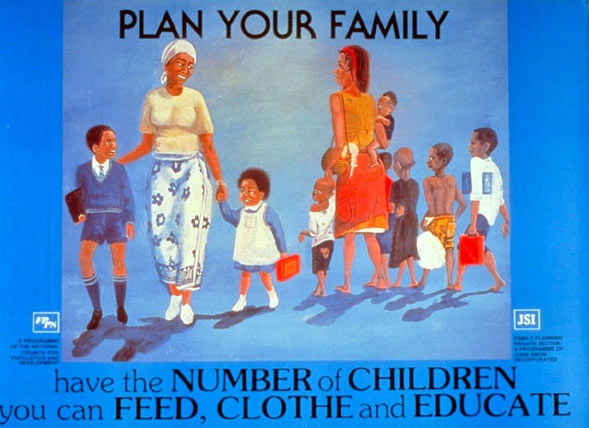
..."WHICH HOME DO YOU CHOOSE?"...
In Waugh's time Kenya, now 40 million, had 3 million people.
Foreign diplomatic representations Waugh gives details of the Americans, the English and the French.
The French. In the French embassy it is felt that the present circumstances are not favourable to France, though it does not get clear why, apart from the lack of French, instead English and Wanda speaking members of government. French ambassador Ballon is frantically practicing the language of the rival tribe not represented in government, the Sakuyu. The French suspect the English (supported by the Italians) of playing a neat game to keep France down in Azania.
The US embassy. The American embassy staff are depicted as mere petty competitors to Youkoumian in profitably selling to government.
The British. Waugh then turns to detail the embassy life of the English: in a residence out of town only to be reached on a donkey, the ambassador Sir Samson Courteney, his family and some staff lead a happy retired life of games in a garden meticulously kept by Sir Samson's wife, using bulbs send from England with the irregular mail boat in packages eagerly looked forward to because they also contain letters, newspapers, magazines, cigars, and some official papers that Sir Samson directly refers to staff instructed never to come back with them, for the ambassador cherishes his rest. Neither does he want to be bothered with local politics, and certainly not by details about who did what. Sir Samson hates having to remember names and issues between people anyway.
This is the man suspected by French ambassador Ballon to pull the strings in the Empire of Azania. Ballon's people hired the British embassy butler as a spy to regularly get reports. These consistently add to their suspicions of Sir Samson Courteney as a shrewd and formidable enemy. Such things as intercepted undecipherable telegraph code (chess moves, in fact, sent to a British staff member involved in an intercontinental game) can bring the French in nervous alert.
NGOs. A constant feature of African countries is the operations of NGOs (Non Governmental Organizations). They are funded by donor countries or their citizens privately, and have some kind of mission statement like fighting hunger (and others: obesity). Or: keeping as many people alive as possible (others: make sure less get born). Many other NGO's have rival mission statements as well. Nothing yields better figures for nature conservation than rebels chasing rural people to the towns, but other NGO's take care of safety (for humans, not for animals!) in rural area's.
Every disease specialist group has an annual conference where an officer supplies the statistics to the press showing that their disease is the most important world wide, or at least in Africa: AIDS, malaria, malnutrition, obesity (obesity recently is making surprise attempts to get under the umbrella of malnutrition) and so on. The respective annual conferences are spread over the year and media agents do not seem rewarding a bringing together of all disease groups to settle the matter. Africa was divided in British, French, etc. colonies, but we've gone sans frontières and now divide in AIDS, malaria, dengue fever etc.
Waugh features two ladies of the SPCA (Society for the Prevention of Cruelty to Animals, existing up to now as KSPCA, Kenya , USPCA, Uganda etc.), who announce their visit to the embassy and the emperor. The emperor asks Basil: "is it cruel to spear lions d'you think?" Basil thinks not. Advises to decline the visit. But the emperor disagrees. An imperial welcome dinner gets scheduled. When the ladies are received, they already had some rough days. The embassy had refused to lodge them, one of its attachés had brought them from the arriving train straight to Youkoumian's shabby drinker's hotel, were they got even more ripped off than in the unnecessary half way overnight train stop hotel forced on the traveller by a shady deal between the government and a shrewd Indian hotel owner. Moreover since the attaché's car was full of newspapers, magazines, cigars, plant bulbs, and so forth brought by the train, there had been no place for one of the ladies trunks. It got trusted to a carrier who, naturally, had disappeared with it.
At dinner Minister of the Interior Imperial Viscount Boaz, a Wanda, had the honour to address the guests. In his preparation, He had to rely on written information about the mission statement of the NGO, translated into Wanda by his English speaking interpreter, who seemed to have made some reading lapses when his index finger had meticulously passed the words one by one. Now this same interpreter translated the Viscount's Wanda-speech into English for the guests at table, as follows: "Your Majesty, Lords and Ladies. It is my privilege and delight this evening to welcome with open arms of brotherly love to our city Dame Mildred Porch and Miss Tin, two ladies renowned throughout the famous country of Europe for their great cruelty to animals. We Azanians are a proud and ancient nation but we have much to learn from the white people of the West and North. We too, in our small way, are cruel to our animals" - and here the Minister for the Interior digressed at some length to recount with hideous detail what he had himself once done with a woodman's axe to a wild boar - "but it is to the great nations of the West and the North and especially to their worthy representatives that are with us to-night, that we look as our natural leaders on the road of progress......".
Contemporary NGO staff can tell you hosts of such stories concerning their contacts with local African officials until today. An amusing detail is a tool popular with NGOs: the distribution of T-shirts featuring their slogans. People will wear any T-shirt you give them, no matter what's written on it. They can't read. At the end of secondary school the reading skills still are defective and more than half of the words they "rite" are misspelled. Even government backed newspapers, crammed with the President's tribe's laureates of the local universities, rarely contain a paragraph without spelling error.
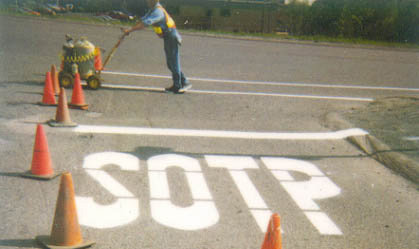
When the shirt contains pictures only, this does not guarantee we understand what it is about. After the second Iraq war and the untimely decease of its dictator a Youkoumian in Tanzania got handsome profits from importing very cheap colourful shirts portraying Saddam Hussein in a landscape of tanks, rockets and cannons. At other occasions, however, one knows who it is. Obama T-shirts abound, "artists" frantically copy them on well selling paintings, but the explosive boost, after 9/11, of Bin Laden T-shirt sales in Uganda got quickly suppressed.
Emperor Seth: "we are Progress and the New Age".
In a golden "Integrity
Centre" we sit to fight corruption.
Obama on the spare wheel cover, the prestige
park has a smoking zone signpost,
Waugh 1930: "...prominently in
English....where every foreigner might read it"
Seth's modernization starts, assisted by his minister Basil, to alienate significant Azanian powers: general Connolly, forced on that heap of what seller Youkoumian told Basil are "government stuff, damn rotten" boots has them eaten by his soldiers. Seth's preparations for his grand birth control pageant alienated the churches, moreover town symmetry considerations inspire Seth to the forced demolition of the Anglican cathedral. Ballon cheers: "now we have the army and the churches".

...town symmetry considerations inspired Seth to the
forced
demolition of the Anglican cathedral...
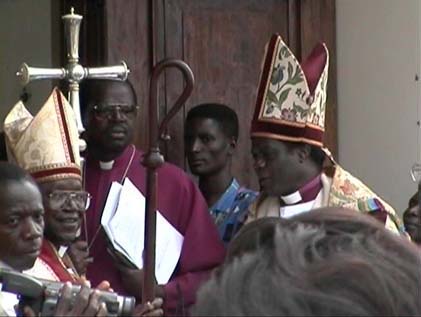
French ambassador Ballon: "...we have the army and the churches!..."
Ballon: Sir Samson may have played a neat game, but now it is over! French residence parties start to host the conspiracy for Seth's overthrow. Then things get launched, the birth control pageant is thought the proper moment. The crowd comes under attack, banners ("WOMEN OF TOMORROW DEMAND AN EMPTY CRADLE" "THROUGH STERILITY TO CULTURE") flying in the air, Seth flees into the jungle with his Minister of the Interior "Count" Boaz. Boaz kills Seth, thinking it a good addition to his c.v. when applying to the new government. But one day later a messenger comes to Boaz's jungle camp with the news that the tide has turned back to Seth's side. The poor man gets hanged by a disappointed and obviously now desperate Boaz.
Even now, 80 years later, embassy staff are not known for intelligence nor for the efficient supply of their services to their own citizens and certainly not to foreigners. But this a general issue, not specific for Africa. A more special African characteristic is the major world powers' interest in local African rivalries and the tendency of some to support the local rivals of the ones supported by others. This, for instance in Congo, over 30 years after the appearance of Waugh's book, famously caused the untimely decease of young USSR-backed Lumumba by US-friendly forces.
It also helped Nyerere to power by allowing the USSR to groom him and it inspired the USSR to support the South African black liberation movement ANC. It shaped accusations of the French vis à vis the Ruandan genocide. African countries call themselves "independent". All celebrate their day of independence every year. But far away rich countries are on the tongues in every major African conflict. And to enter an African country in the early 21st century, you have to pay for a visa. In dollars. We do not accept our own currencies.
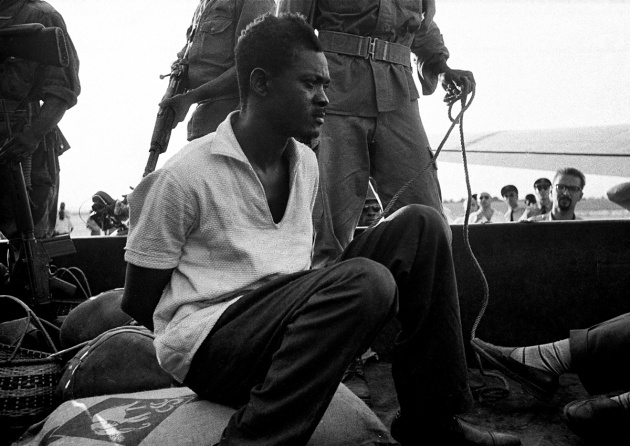
Count Boaz: "Who said it was a disease? I said he was
shot?
That is a mistake. He took poison. That is how it happened..."
Couleur locale. As a fixed background along which his events move, Waugh uses, first, of course, survivor Youkoumian, but second a Sakuyu family. One morning, the heavily pot holed half-a-mile road from the harbour to the railway station gets cleared for the afternoon's festive reopening of the railway "A gang of convicts, chained neck to neck [nowadays not chained, but in yellow or striped pyjamas, with armed guards B.H.], were struggling to shift a rusty motor car which lay on its side blocking the road. ...White ants had devoured the tyres; various pieces of mechanism had been removed from time to time to repair other engines. A Sakuyu family had set up house in the back, enclosing the space between the wheels with an intricate structure of rags, tin, mud and grass". However, when in the afternoon the railway is reopened by the emperor Seth, he and his retinue with drums and fife arrived more than an hour late "...held up by the derelict motor car which had all the morning resisted the efforts of the convicts to move it. The Civil Governor in whom rested the ultimate responsibility for this mishap, was soundly thrashed and degraded from the rank of Viscount to that of Baronet before the procession could be resumed".
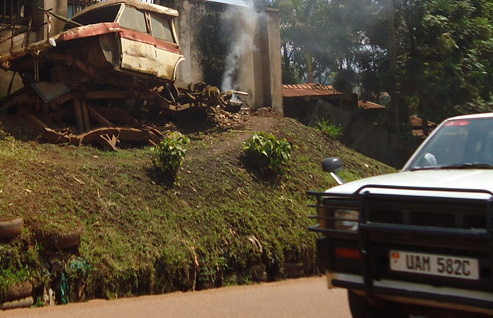
...an intricate structure of rags, tin, mud and grass...
When, on the last pages, Seth is dead and
Western powers had sent in police, soldiers and even inspectors and judges to
restore order, Reppington, chatting over an expat's veranda sundowner cocktail
casually mentions: "...We settled that
case...you know, the one of the natives who built a house in a broken lorry in
the middle of the road"
"Oh, ah. Who won it?"
"Oh, we gave it to the chap
in possession on both counts....They'll have to make a new road around him
now..."
Visiting home. Until today expats visiting home meet a general
reluctance of their loved ones to modify their image of Africa with travellers'
stories. Basil, back in London to Sonia: "What's been happening?"
"Almost
nothing. Every one's got very poor and it makes them duller...there was a
general election and a crisis - something about gold standard... [Basil had been off
during the economic collapse after the great crash of 1929, B.H.]...Alistair
found something about Azania in the papers once. I forget what. Some
revolution...I suppose you were in all that."
"Yes."
"Can't think what you
see in revolutions. They said there was going to be one here, only nothing came
of it. I suppose you ran the whole country."
"As a matter of fact, I did."
"And fell madly in love."
"Yes."
"And intrigued and had a court official's
throat cut."
"Yes."
"And went to a cannibal banquet. Darling I just don't
want to hear about it, d'you mind?"
"That's the way to deal with
him," said Alistair from his arm chair. "Keep a stopper on the far-flung stuff."
"Or
write a book about it sweety, Then we can buy it and leave it about where you'll
see and then you'll think we'll know...What are you going to do now you're
back?"
All Basil's confirmations to Sonia's questions as far as not dealt with in this article are the truth and nothing but the truth. And he was at the cannibal banquet, thought by Sonia too absurd to wait for the answer. Read the book.


